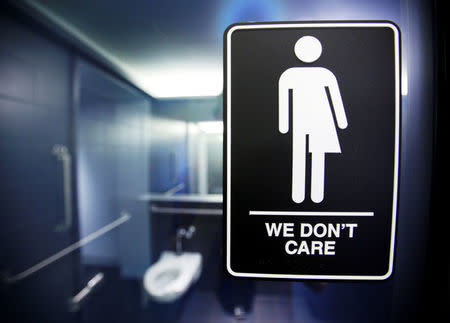Governor, artists take aim at states' transgender bathroom measures

By Colleen Jenkins WINSTON-SALEM, N.C. (Reuters) - North Carolina's governor on Tuesday made his latest attempt at convincing legislators to repeal a law that restricts bathroom access for transgender people, while more than 140 entertainers called a similar measure proposed in Texas "a poison." The legislation proposed by Democratic Governor Roy Cooper in North Carolina drew immediate criticism, with Republican supporters of the law saying it ignored privacy concerns and opponents saying it included unnecessary concessions. Cooper announced his plan a week after a local sports official said the law known as House Bill 2 could cost the state six years of NCAA championship events over concerns about discrimination. "The situation is urgent," Cooper said at a news conference in Raleigh. "This proposal will begin to repair the damage to North Carolina's reputation." Corporations, entertainers and conventions boycotted the state after its Republican-controlled legislature adopted a law last March that bars transgender people from using government-run restrooms that match their gender identity and limits local nondiscrimination protections. Dozens of performers including Lady Gaga, Alicia Keys, Amy Poehler, Ariana Grande, Ewan McGregor and Jennifer Lawrence weighed in on Texas' bathroom bill on Tuesday, signing a letter saying it would deny transgender people a basic dignity. "Bills like these are a poison, a barrier between Texas and its future," the artists said in a letter released by LGBT rights groups including Equality Texas. Cooper's plan in North Carolina includes a full repeal of that state's law and harsher penalties for crimes committed in bathrooms and dressing rooms. His proposal would require local governments to provide 30 days notice to state lawmakers before voting on nondiscrimination ordinances, ensuring an opportunity for input, he said. Such an ordinance in Charlotte prompted the legislature to act last year, with Republican lawmakers warning the state's largest city was creating a public safety issue by giving men access to women's bathrooms. Those concerns remain, Senate leader Phil Berger's office said. "This proposal does nothing to address the basic privacy concerns of women and young girls who do not feel comfortable using the bathroom (or) undressing and showering in the presence of men," Berger spokeswoman Amy Auth said in a statement. Equality advocates said there was no evidence current penalties for sex crimes in restrooms were insufficient. "We all know that transgender people do not pose a public safety risk and should be protected from discrimination, not made the targets of it as H.B. 2 does," said Equality NC Executive Director Chris Sgro, who called Cooper's proposal "unnecessary." (Reporting By Alan Crosby)

